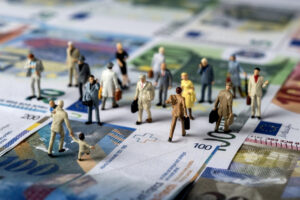
According to Serbian Economist, the Serbian Ministry of Education has announced the financing of educational materials for migrant schoolchildren, including the translation and adaptation of materials into Ukrainian, as the language barrier remains one of the key challenges in integrating children into the education system.
Education Minister Dejan Vuk Stankovic noted that more than 5,500 migrant and asylum-seeking students have consistently passed through the Serbian education system. According to him, the ministry continues to support schools where migrant children study: mentors and external consultants are involved, and teaching materials are translated into the students’ native languages, currently Ukrainian and Arabic.
Stankovic reported that as part of this work, training events were held for more than 4,000 educators, teachers, principals, and support specialists, and more than 70 schools received support through grants. In addition, more than 3,000 individual support plans have been prepared and more than 10,000 additional classes have been held; support measures also included the distribution of books, textbooks, and school supplies.
The ministry also noted that the work on translating materials and supporting schools is being carried out with the participation of international partners. However, the amount of expenditure and the number of textbooks printed or materials translated into Ukrainian were not disclosed in the ministry’s public statements.

Updated rules for producers of grapes and wine products have been in force in Ukraine since January 1, 2026, they are approved by the law “On grapes, wine and wine products” (#3928-ІХ), adopted by the Verkhovna Rada on August 22, 2024. The law introduces updated rules for producers of grapes and wine products, establishes modern requirements for the cultivation of grapes, production, labeling and circulation of wine, and brings the Ukrainian system closer to European standards.
One of the key elements of the document is the protection of geographical indications – classification according to the European model, according to which a clear division of wines by origin into wines with protected appellation of origin (PAO) and wines with protected geographical indication (PGI) is introduced. Clear rules have been established for the official recognition and protection of geographical indications, allowing producers to secure regional brands and guarantee consumers authentic quality.
An important tool for streamlining the industry will be the creation of the Viticulture and Wine Registry: the state is introducing a unified information system where all grape plots, grape production and viticulture products will be registered. This will guarantee full traceability of the product from the vine to the store shelf.
In addition, the said law provides for simplification of conditions for small winemakers, which will stimulate the development of the craft segment and gastrotourism.
At the same time, Ukraine introduces strict requirements to the label: the information that must be available to the consumer is clearly regulated, which prevents falsification of wines.
The law updates the terms and classification of wine products, establishes quality standards and labeling requirements. It defines the procedure for state control and general principles of development of the winegrowing and winemaking industry.

In Romania, a penitentiary institution has launched a “service advertisement” for individuals and companies: prisoners can be hired for domestic and seasonal work at a rate of about 27 lei per hour, based on a simple service contract.
The jobs advertised include chopping wood, manual earthworks, tree pruning/clearing, and clearing plots of land, ditches, and canals. The announcement also states that food and security/escort are provided by the institution, and transport to the work site can be provided separately at a rate of approximately 2 lei/km.
This refers to Penitenciarul Mioveni (Romania), as reported by the Romanian media with reference to the institution’s publication.
The context provided in the article: against the backdrop of a labor shortage, many companies in Romania are attracting workers from non-EU countries. According to data cited from a study by the Economic and Social Council (CES), of the 136,334 third-country nationals with work permits (as of the end of August), the largest groups are from Nepal and Sri Lanka.
The list of countries whose citizens are mentioned in the article as the main groups of workers from third countries includes Nepal, Sri Lanka, Turkey, Moldova, India, Bangladesh, China, Syria, Egypt, and Pakistan.

If current demographic trends continue, the EU population will age and begin to decline after the middle of the decade, and in a scenario of zero net migration, the decline could be sharp, to approximately 294 million by 2100, according to calculations based on Eurostat projections (EUROPOP2023).
According to Eurostat’s baseline scenario, which assumes continued positive net migration, the EU population will grow from 446.7 million in 2022 to a peak of 453.3 million in 2026, after which it will gradually decline to 419.5 million by 2100 (down 6.1% from 2022).
At the same time, Eurostat also publishes alternative scenarios (sensitivity tests), including a zero net migration option. In this scenario, the total population of the EU by the end of the century is significantly lower – estimated at around 294 million people, which means a reduction of about one-third from mid-2020s levels. These differences are also highlighted in visualizations based on Eurostat data, as cited by regional media.
The key driver of population decline is negative natural growth. According to Eurostat estimates, between 2022 and 2100, approximately 291.3 million people could be born in the EU, with 416.6 million deaths (a net reduction due to natural movement of approximately 125.3 million), while cumulative net migration in the baseline scenario will partially offset the losses, adding about 98.1 million people.
At the country level, the differences are even more noticeable. In Eurostat’s baseline scenario, the largest population declines by 2100 are expected in Latvia and Lithuania (more than a third), as well as in Greece. At the same time, a number of countries, on the contrary, show population growth due to migration, including Luxembourg and Ireland.
It is noted separately that for Croatia, Eurostat’s baseline scenario predicts a decline in population from about 3.86 million in 2022 to about 2.82 million in 2100, while in scenarios with stricter migration assumptions, the final figures may be lower.

In the temporarily occupied territories of Ukraine, perceptions of the EU and the US are formed not through their own experience, but through the prism of Russian propaganda and information isolation. This was stated by sociologist, director of the Active Group research company Oleksandr Poznyi during his speech at the Forum on Countering Russian Propaganda and Disinformation, held on December 17-18, 2025 in Brussels.
In his speech, the expert relied on the results of sociological studies conducted in 2023-2025 and emphasized that residents of the temporarily occupied territories are virtually deprived of direct communication with Europe and the United States. In such circumstances, the perception of the West is formed mainly through narratives imposed by the occupation authorities. “For many people in the TOT, Europe and the United States are not partners or allies of Ukraine, but abstract, distant actors whose image is almost entirely shaped by the Russian media,” said Poznyi.
According to the sociologist, Russian propaganda systematically forms two dominant images of the West. The first one is aggressive and hostile, which allegedly “controls Ukraine”, “provokes war” and “uses Ukrainians in its own interests”. The second is cynical and indifferent, “tired of Ukraine” and ready to sacrifice its territories for the sake of stability. “These narratives contradict each other but coexist perfectly. They are not about logic, they are about emotion and fear,” explained Poznyi.
As a result, a part of the population has a distorted view of the role of the EU and the US, which has nothing to do with the real policy of supporting Ukraine, but directly affects public sentiment and expectations for the future. One of the key reasons for this perception is complete information isolation. Ukrainian and Western sources of information are blocked or criminalized, and any alternative viewpoints are viewed as “extremism” or “espionage.”
“People cannot verify information. They are forced to live inside an information bubble where the West is an image, not a reality,” the sociologist emphasized. According to him, even those TOT residents who support Ukraine internally often avoid talking about Europe or the United States, as these topics are considered “dangerous” and may arouse suspicion on the part of the occupation structures.
During the forum in Brussels, these observations were presented as a serious challenge for European policy. According to Poznyi, the perception of the EU and the US in the occupied territories will directly affect the processes of de-occupation and reintegration in the future. “If people have been hearing for years that Europe is an enemy or a traitor, these perceptions do not automatically disappear after de-occupation,” he emphasized.
The Forum on Countering Russian Propaganda and Disinformation, held on December 17-18, 2025 in Brussels at the European Parliament and the European Economic and Social Committee, was dedicated to strengthening Europe’s cognitive and information resilience in the face of hybrid threats.
The event brought together representatives of European institutions, think tanks, media and civil society from Ukraine and the EU. The event was aimed at outlining the scope and mechanisms of Russian propaganda, showing its destructive impact on public consciousness, and discussing ways to counter it.

The share of EU residents aged 16-74 who used generative artificial intelligence tools (such as ChatGPT, Gemini, Grok, etc.) in 2025 was 32.7%, according to the European Union’s statistical service (Eurostat).
According to Eurostat, such services were most often used for personal purposes (25.1% of respondents), less often for work (15.1%) and formal education (9.4%).
Among EU countries, the highest prevalence of generative AI use was recorded in Denmark (48.4%), Estonia (46.6%), and Malta (46.5%), while the lowest rates were recorded in Romania (17.8%), Italy (19.9%), and Bulgaria (22.5%).
According to Euronews, citing European statistics, in a sample of 33 European countries, the highest level of use was recorded in Norway (56%), and the lowest in Turkey (17%); The group of countries with penetration above 40% included Denmark, Estonia, Malta, Iceland, Finland, Croatia, Belgium, Sweden, Slovakia, Lithuania, the Netherlands, and Switzerland.
Ukraine does not appear in this European comparison. At the same time, according to a KIIS survey (fieldwork period: February 14-March 4, 2025), 26% of adult Ukrainians had practical experience using AI, with 17% doing so regularly (including 12% daily or almost daily).
Source: https://expertsclub.eu/32-zhyteliv-yes-u-2025-roczi-vykorystovuvaly-shi/